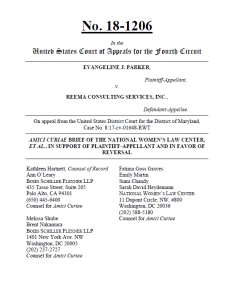
Update: The Fourth Circuit reversed the lower court ruling in its decision by an unanimous three-judge panel, holding that rumors that a female employee slept with her male boss to obtain promotions can give rise to her employer’s liability under Title VII for sex discrimination. The Fourth Circuit revived the claims of sex discrimination in this case agreeing that “the traditional negative stereotypes regarding the relationship between the advancement of women in the workplace and their sexual behavior” are still at play and allowing harassment based on such stereotypes can violate federal law. NWLC’s related blog can be found here.
The National Women’s Law Center moved to file an amicus brief for consideration in Parker v. Reema Consulting Services, Inc alongside 43 other organizations on Wednesday, May 30th to urge the U.S. Court of Appeals for the Fourth Circuit to reverse the opinion of the trial court that inappropriately dismissed this case. NWLC worked with law firm partners Ann O’Leary and Kathleen Hartnett of Boies Schiller Flexner LLP (BSF) on this brief.
In this case, the plaintiff, Evangeline J. Parker, represented by the Washington Lawyers’ Committee for Civil Rights and Urban Affairs and Fish & Richardson, P.C. sought to challenge a gender-based hostile work environment, retaliatory termination, and discriminatory termination under Title VII. Ms. Parker faced unfounded and sexually-explicit rumors based on her gender following her promotion within the company. Specifically, a rumor was circulated among employees that she gained a promotion by having sexual relations with a higher-up. When she reported the situation to human resources, the company retaliated against her by terminating her instead of resolving the matter. Rather than viewing this as a clear claim of sex discrimination and retaliation, particularly at the motion to dismiss stage, Judge Titus, for the federal district court in Maryland, dismissed the complaint, giving his reasoning on the record during a hearing on the motion to dismiss. The Court held that the rumor and any harassment the plaintiff experienced was not based on her gender, “but rather based on her alleged conduct,” and was therefore not actionable under Title VII. The Court explained that the same kind of rumor could have just as well been used against a male employee. The Court also ruled that because the complaint failed to establish discrimination based on gender, there was also no actionable retaliation claim, which is an incorrect reading of retaliation law.
Our amicus brief includes the following key points: It is crucial that the law recognize that the conduct at issue here is sex discrimination, as evidenced through legal precedent and social science. We highlight how such rumors about women “sleeping their way to the top” are based on and reinforce gender stereotypes, and particularly harm women who are advancing in their careers. We also make note that if the same conduct happened to a male employee, it could still constitute sexual harassment based on gender. We also argue that the standard for retaliation was met, and that the Court made inappropriate factual determinations in dismissing the case at the motion to dismiss stage.
In light of the growing #metoo movement, it is particularly crucial that courts understand how to assess and adjudicate claims of sexual harassment. Women who experience sexual harassment in the form of malicious rumors meant to question their expertise and thwart their careers are experiencing a form of sex discrimination. Indeed, current and future sexual harassment cases are in danger of dismissal unless we persuade the Fourth Circuit that the lower Court’s reasoning is untenable and not in line with the federal legal standards governing sexual harassment and retaliation.

